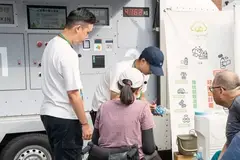Key takeaways
- FNG, a Taiwan-based company, has developed an AI-powered plastic bottle recycling machine that sorts bottles by color and type
- The machine uses an AI database to assess factors like compression and cleanliness, enabling smoother recycling.
- FNG’s mobile recycling vehicle has toured local communities, offering users incentives through a contactless smartcard for bottle recycling.

For Next Generation (FNG), a Taiwan-based company that integrates circular technology and social responsibility, has unveiled a plastic bottle recycling machine that uses AI to sort bottles by color and type before processing. The design aims to cut transport emissions and accelerate workflows.
According to FNG, the trained AI database enables the machine to identify factors such as the degree of compression and cleanliness of PET bottles, helping it avoid “jams” during processing.
“FNG advocates producer-led recycling, enabling discarded products to undergo recycling and be remanufactured into new goods, putting into practice the principles of a circular economy and the ‘cradle-to-cradle’ concept,” says the company.
Advanced technology for local communities
The FNG team attended training courses at the Taiwan Design Research Institute, a move the company said helped avoid miscommunication that can be common with outsourced development and reduced operating costs.

FNG founder Tsai Jin-peng shares that in the early stages of introducing AI technology, the company faced challenges due to varying levels of digital maturity among employees. Taiwan Design Research Institute has provided digital transformation programs and courses to support the R&D process, allowing the integration of AI technology into the operations.
Tsai says despite PET bottle recycling machines being common in many countries, achieving precise recycling remains challenging. While manual labor can identify the condition of recyclables, it is reliant on the traditional fixed-site recycling model, which requires intense work.
The innovation is built on top of FNG’s mobile recycling vehicle equipped with a machine for sorting, compressing, removing labels, and breaking down bottles directly onboard.
The vehicle has toured communities, schools, and businesses across the island country. For every four bottles inserted, users receive NT$1 (US$0.03) credited to their EasyCards, a contactless smartcard used for public transportation and purchases at convenience stores.
In the UK, the National Cup Recycling Scheme joined forces with environmental charity Keep Wales Tidy to introduce an AI paper cup recycling scheme. The waste sorting app could analyze cups through AI photographic detection rather than a barcode system.
Earlier this year, Tomra Recycling expanded its advanced metal recycling portfolio with the application of its AI-based GainNext sorting technology. The company says the deep learning solution can improve the purity of molded aluminum scraps.












